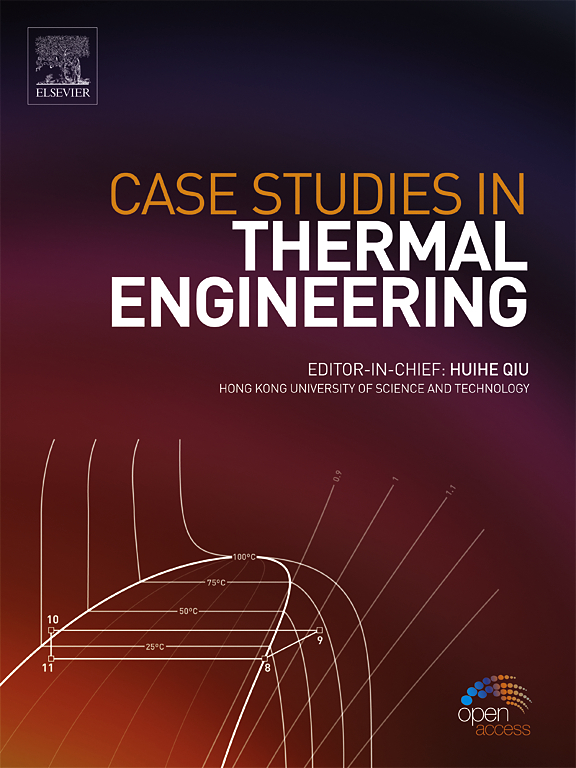提高综合传热性能的速度场、温度场和压力场局部协同角
IF 6.4
2区 工程技术
Q1 THERMODYNAMICS
引用次数: 0
摘要
本研究综合了对流传热和流动阻力的场协同原理。提出了速度场、温度场和压力场的局部三场协同角,用于评价传热和泵送功耗的局部综合性能。该角度基于分别以速度梯度和焓梯度/总压梯度的点积为坐标的曲线图的极角。通过观察发现,以泵送功率为代价提高传热速率的情况会从第二象限下降到第四象限,从而对极角进行偏移。协同角的应用通过具有不同翅片结构的通道中的流动和传热实例来证明。受协同角分布的启发,设计了翼面-矩形鳍片和Rhom-矩形鳍片结构,它们可以在限制泵功率消耗的情况下提高传热速率。本研究为提高传热效果提供了一种可行的方法。本文章由计算机程序翻译,如有差异,请以英文原文为准。
A local synergy angle of velocity, temperature and pressure fields for enhancement of comprehensive heat transfer performance
The field synergy principles for convective heat transfer and flow resistance are integrated in this study. A local three-field synergy angle of velocity, temperature and pressure fields is proposed to evaluate the local comprehensive performance of heat transfer and pumping power consumption. The angle is based on the polar angle of a plot with dot products of velocity and enthalpy/total pressure gradients, respectively, as coordinates. The polar angle is then shifted by the observation that the enhancement of heat transfer rate at the cost of pumping power decreases from the second quadrant to the forth quadrant. The application of the synergy angle is demonstrated by examples of flow and heat transfer in channels with different fin structures. Inspired by the distribution of the synergy angle, Airfoil-Rect fin and Rhom-Rect fin structures are designed, which can improve the heat transfer rate with constraints of pumping power consumption. The present study provides a possible approach for heat transfer enhancement.
求助全文
通过发布文献求助,成功后即可免费获取论文全文。
去求助
来源期刊

Case Studies in Thermal Engineering
Chemical Engineering-Fluid Flow and Transfer Processes
CiteScore
8.60
自引率
11.80%
发文量
812
审稿时长
76 days
期刊介绍:
Case Studies in Thermal Engineering provides a forum for the rapid publication of short, structured Case Studies in Thermal Engineering and related Short Communications. It provides an essential compendium of case studies for researchers and practitioners in the field of thermal engineering and others who are interested in aspects of thermal engineering cases that could affect other engineering processes. The journal not only publishes new and novel case studies, but also provides a forum for the publication of high quality descriptions of classic thermal engineering problems. The scope of the journal includes case studies of thermal engineering problems in components, devices and systems using existing experimental and numerical techniques in the areas of mechanical, aerospace, chemical, medical, thermal management for electronics, heat exchangers, regeneration, solar thermal energy, thermal storage, building energy conservation, and power generation. Case studies of thermal problems in other areas will also be considered.
 求助内容:
求助内容: 应助结果提醒方式:
应助结果提醒方式:


